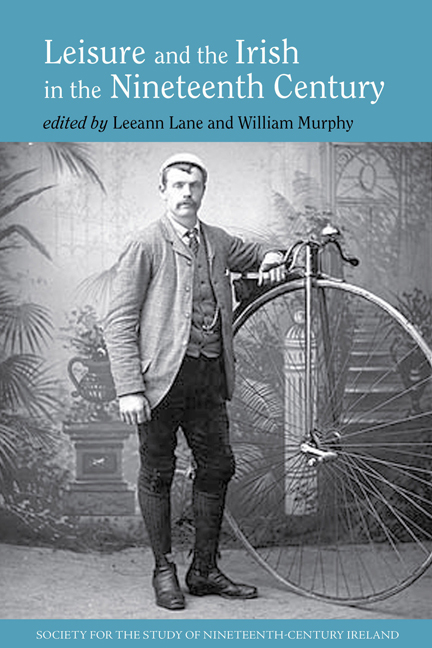Book contents
- Frontmatter
- Contents
- List of Figures and Tables
- Introduction
- Leisure and Associational Culture
- Leisure Spaces
- 3 Muscles and Morals: Children's Playground Culture in Ireland, 1836–1918
- 4 Photography and Leisure: The Rise of the Photographic Studio in Mid- to Late-Nineteenth-Century Dublin
- 5 The Establishment and Evolution of Limerick City Municipal Library, 1889–1938
- Leisure in Literature
- Leisure, Tourism and Travel
- Leisure and Female Élites
- Notes on Contributors
- Index
5 - The Establishment and Evolution of Limerick City Municipal Library, 1889–1938
from Leisure Spaces
- Frontmatter
- Contents
- List of Figures and Tables
- Introduction
- Leisure and Associational Culture
- Leisure Spaces
- 3 Muscles and Morals: Children's Playground Culture in Ireland, 1836–1918
- 4 Photography and Leisure: The Rise of the Photographic Studio in Mid- to Late-Nineteenth-Century Dublin
- 5 The Establishment and Evolution of Limerick City Municipal Library, 1889–1938
- Leisure in Literature
- Leisure, Tourism and Travel
- Leisure and Female Élites
- Notes on Contributors
- Index
Summary
Introduction
Limerick city established its first municipal library in 1893, after decades of debate and discussion. The entire process was replete with paradox. From the beginning, the adoption of the Library Acts in Limerick was intended to have strictly utilitarian results, such as ‘public instruction’, the ‘development of local taste and local talent’ and the development of the local artisans’ skills set. Indeed, the original intention was to use the library legislation as a means of assisting the struggling Limerick School of Art. On these grounds, the parsimonious municipal councillors and ratepayers adopted the Library Acts. The provision of a public leisure space did not form part of their vision. However, their action resulted in the provision of a municipal library, which, judging by the book stock and readership, was to become a significant recreational facility.
Reading as a leisure activity
Although reading has existed since the invention of writing and literacy, its emergence as a leisure activity in Western civilisation dates only to the sixteenth century, largely due to the invention of printing. Over the next three centuries, recreational reading expanded in tandem with the growth of literacy, the percolation of prosperity downwards to a growing percentage of the total population and the resultant emergence of the concept of organised leisure. Two major innovations were the emergence of silent solitary reading as a widespread phenomenon in the eighteenth century and the development of mass literacy in several Western societies in the nineteenth century. Both of these trends were symbolised by the rise of the novel and the circulating library. Truly it has been said that ‘reading, especially novel reading – either by oneself or to others – dominated the recreation of the Victorians.’
Although outside Ulster Ireland did not experience the Industrial Revolution and in consequence remained economically underdeveloped compared with some of its European neighbours it experienced many aspects of social change associated with the modernisation process, including the growth of mass education and the expansion of the middle classes. Education at both primary and secondary levels expanded exponentially. The percentage of the population aged five or more that could neither read nor write declined from 53 per cent in 1841 to 11.9 percent in 1911. Print culture expanded rapidly and with it provision of municipal libraries.
- Type
- Chapter
- Information
- Leisure and the Irish in the Nineteenth Century , pp. 99 - 116Publisher: Liverpool University PressPrint publication year: 2016



